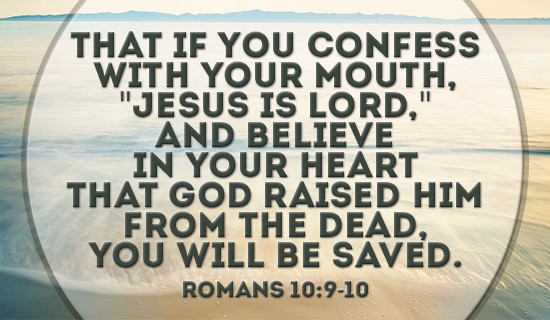OUR BELIEFS: THE GOSPEL

When a person is seeking salvation, repentance will provoke the question: “What must I do to be saved?” Well, the answer is to believe and have faith in the Gospel, for it is the power of God that brings salvation (Romans 1:16).
Biblical faith is defined as belief, trust and confidence. It also involves fidelity, which can be defined as faithfulness to a person, cause, or belief, demonstrated by continuing loyalty and support.
Without faith it is impossible to please God (Hebrews 11:6).
In order for a person to be saved, they must believe and have faith in the Gospel (“good news”). (Mark 1:15)
Here are six basic elements of the “good news” or Gospel of Jesus Christ:
1) JESUS CHRIST HAS COME IN THE FLESH
1 John 4:2-3, 2 John 1:7, Isaiah 9:6, Matthew 1:23, John 14:9-10, Jeremiah 23:5, 1 Timothy 3:16, Zechariah 12:10, John 10:30
The Apostles Creed puts it like this: “…I believe in Jesus Christ, his only Son, our Lord, who was conceived by the Holy Spirit, born of the Virgin Mary…”
It is extremely important that we believe that Jesus is God who took on human form when He appeared on earth over two thousand years ago. Indeed, as the apostle John points out in his letters, that anyone who doesn’t believe this doesn’t really have the Spirit of God (but the spirit of the Anti-Christ).
The mark of a false religion is not believing this vital fact about Jesus being God who took on human flesh. There are many examples today, but we could mention the Jehovah Witnesses and Mormons to name a couple. Also, the Gnostics believed that Jesus’ physical body was not real but only seemed to be.
2) JESUS DIED FOR OUR SINS
1 Corinthians 15:3, Isaiah 53:5, Romans 4:25, Galatians 1:4, Hebrews 10:1-18
Hebrews 9:22 tells us that “without the shedding of blood there is no forgiveness.” In my previous blog, Our Beliefs: Mankind , we saw the human condition ever since The Fall. In the Old Testament, animal sacrifices were made as a temporary covering and forgiveness but when Jesus died on the cross, it dealt forever for our sins and no further sacrifices are required. (Hebrews 10:1-18).
Jesus Christ’s death on the cross is the atonement or propitiation for our sins. It satisfied God’s anger and it made amends for our sins (1 John 2:2).
Jesus Christ’s death on the cross was vicarious. That is to say that Jesus was substituted for humanity (He took our place on the cross) and was punished for our faults in order to pay for the sins we had committed so that we can be reconciled to God (Isaiah 53:5; 1 Peter 3:18; Mark 10:45)
3) JESUS WAS BURIED
1 Corinthians 15:4, Matthew 12:40, Psalm 16:10
This is essential to fulfil what Jesus said about being like Jonah being in the whale for three days, so the Son of Man will be in the heart of the earth for 3 days too (Matthew 12:40).
The thing about a burial is that it brings closure. When a relative goes to a funeral and sees their relative ‘laid to rest’ it brings it home that a person has gone, they have truly past away. That’s why it’s so tragic when a person cannot have access to the remains of a loved one.
Therefore, Jesus being buried in the tomb for three days showed, beyond a shadow of doubt that he had died and that the fact that He rose again was truly miraculous.
It is also clear that during the three days that His body was in the tomb, His Spirit was extremely busy, and we can read what happened in Ephesians 4:7-10 and 1 Peter 3:18-20
4) JESUS WAS RAISED ON THE THIRD DAY
Mark 8:31, 1 Corinthians 15:3-4, Romans 4:24-25, Matthew 16:21, Luke 9:22, Psalm 16:10, Hosea 6:1-3.
“The resurrection of Jesus Christ is not only the supreme validation of His deity; it also validates the Old Testament prophecies that foretold of Jesus’ suffering and resurrection (see Acts 17:2–3). Christ’s resurrection also authenticated His own claims that He would be raised on the third day (Mark 8:31; 9:31; 10:34). If Jesus Christ is not resurrected, then we have no hope that we will be either. In fact, apart from Christ’s resurrection, we have no Saviour, no salvation, and no hope of eternal life. As Paul said, our faith would be “useless,” the gospel would be altogether powerless, and our sins would remain unforgiven (1 Corinthians 15:14–19).
Jesus said, “I am the resurrection and the life” (John 11:25), and in that statement claimed to be the source of both. There is no resurrection apart from Christ, no eternal life. Jesus does more than give life; He is life, and that’s why death has no power over Him. Jesus confers His life on those who trust in Him, so that we can share His triumph over death (1 John 5:11–12). We who believe in Jesus Christ will personally experience resurrection because, having the life Jesus gives, we have overcome death. It is impossible for death to win (1 Corinthians 15:53–57).
Jesus is “the first fruits of those who have fallen asleep” (1 Corinthians 15:20). In other words, Jesus led the way in life after death. The resurrection of Jesus Christ is important as a testimony to the resurrection of human beings, which is a basic tenet of the Christian faith. Unlike other religions, Christianity possesses a Founder who transcends death and promises that His followers will do the same. Every other religion was founded by men or prophets whose end was the grave. As Christians, we know that God became man, died for our sins, and was resurrected the third day. The grave could not hold Him. He lives, and He sits today at the right hand of the Father in heaven (Hebrews 10:12).
The Word of God guarantees the believer’s resurrection at the coming of Jesus Christ for His church at the rapture. Such assurance results in a great song of triumph as Paul writes in 1 Corinthians 15:55, “Where, O death, is your victory? Where, O death, is your sting?” (cf. Hosea 13:14).
The importance of the resurrection of Christ has an impact on our service to the Lord now. Paul ends his discourse on resurrection with these words: “Therefore, my dear brothers and sisters, stand firm. Let nothing move you. Always give yourselves fully to the work of the Lord, because you know that your labour in the Lord is not in vain” (1 Corinthians 15:58). Because we know we will be resurrected to new life, we can endure persecution and danger for Christ’s sake (verses 30–32), just as our Lord did. Because of the resurrection of Jesus Christ, thousands of Christian martyrs through history have willingly traded their earthly lives for everlasting life and the promise of resurrection.
The resurrection is the triumphant and glorious victory for every believer. Jesus Christ died, was buried, and rose the third day according to the Scriptures (1 Corinthians 15:3–4). And He is coming again! The dead in Christ will be raised up, and those who are alive at His coming will be changed and receive new, glorified bodies (1 Thessalonians 4:13–18). Why is the resurrection of Jesus Christ important? It proves who Jesus is. It demonstrates that God accepted Jesus’ sacrifice on our behalf. It shows that God has the power to raise us from the dead. It guarantees that the bodies of those who believe in Christ will not remain dead but will be resurrected unto eternal life.”
5) JESUS IS LORD
Psalm 110:1, Matthew 22:41-45, Romans 10:9, Philippians 2:11, Colossians 1:15-23, Acts 16:31
Every kingdom has a king and in the Kingdom of God, Jesus has been made both Lord and Christ as we read in Acts 2:36.
To acknowledge the Lordship of Jesus is essential for salvation. Romans 10:9 states, “If you declare with your mouth, “Jesus is Lord,” and believe in your heart that God raised him from the dead, you will be saved. In the same way, Acts 16:31 states, “Believe in the Lord Jesus, and you will be saved – you and your household.”
The central message of the Bible is that “Jesus Christ is Lord.” When we accept Jesus Christ as our Saviour, it involves a recognition of His lordship, for the Saviour who saved us when we received Him by faith is the Lord Jesus Christ.
6) JESUS IS JUDGE
Psalm 110:6, John 5:22, Matthew 25:31-34, Isaiah 11:3-4, Ecclesiastes 12:14, Acts 10:42, 17:31, 2 Timothy 4:1, 1 Peter 4:5, James 5:9, 2 Corinthians 5:10, Romans 2:16, Revelation 19:11
When Jesus came to earth in a human form, He came to save us from our sins (1 Timothy 1:15). However, when He returns, He will come to bring Judgement.
The Bible makes it very clear that both the righteous and the unrighteous WILL be judged by God. We will all have to give an account of what we have said and done whilst here on this earth. This is extremely sobering and is a vital element of the gospel that we should always try and keep at the forefront of our minds.
COMING NEXT…..
When a person truly believes and has faith in the Gospel, a remarkable thing happens; that person will become a new creation (2 Corinthians 5:17), they will be ‘born again’ (John 3:3). This is wholly and utterly a complete work of God. It’s known as Regeneration and this will be the subject of our next Blog and also the next stage in Salvation.
